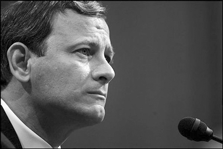Having given court nominee the benefit of the doubt, advocacy group says he failed the test
Groups such as the Human Rights Campaign and the National Gay and Lesbian Task Force announced their opposition to Roberts shortly after he was named in July to fill a vacancy created by the resignation of Associate Justice Sandra Day O’Connor, who had evolved in her years on the Supreme Court from supporting the Georgia sodomy statute in 1986 to providing support for overturning Colorado’s anti-gay Amendment 2 in 1996 and the Texas sodomy law in 2003. Both groups stepped up their criticism earlier this month when Bush proposed that Roberts instead fill the chief justice post vacated by William Rehnquist’s death.
But Lambda’s statement had the virtue of coming after confirmation hearings in which Roberts was asked some of the 30 questions the group said needed to be answered in order to judge his fitness. The group can reasonably say that it gave the president’s nominee as much leeway as possible to prove himself. But, in Lambda’s view, Roberts’ performance at the hearings fell well short of its minimal standards.
"John Roberts had every opportunity to demonstrate whether he is committed to fairness and equality, but chose to dodge key questions,” said Kevin Cathcart, Lambda’s executive director, in a teleconference with the gay media on Monday. “He provided no evidence of his commitment to these fundamental principles, and without such a commitment he is not qualified to serve.”
In particular, the group faulted Roberts for his narrow endorsement of a constitutional right to privacy, in which he voiced support for a 1965 Supreme Court ruling that overturned a Connecticut ban on contraceptives, but would not similarly say that Roe v. Wade, the 1973 abortion ruling, should not be overturned, much less the 2003 Lawrence v. Texas sodomy decision.
“What troubled us at end of day was that he stated that there is a right to privacy in the Constitution, but refused to give us any content to that in ways meaningful to members of our community,” said Jon Davidson, Lambda’s legal director. “He said he would look to history and tradition in addition to precedent. That’s a place to start. We’re afraid this is where he would end.”
Later, Davidson said Roberts “describing privacy as something he would decide almost completely by history and tradition left us with qualms,” since those are arguments typically marshaled against gay rights.
Lambda noted that Roberts resisted repeated questions from New York Democrat Charles Schumer about whether he agreed with Clarence Thomas’ dissent in Lawrence that sodomy laws do not violate gay people’s right to privacy. In refusing to equate the sodomy ruling with the 1965 contraception decision as a settled matter, Lambda charged that Roberts was inviting a challenge to Lawrence.
Asked whether the Senate had done all it could to probe Roberts’ views, Davidson said that the group would like to have heard more questioning about the type of equal protection analysis that supported the 1996 Colorado ruling that struck down a state constitutional amendment that barred any state or local gay rights ordinances (and on which the nominee provided brief pro bono assistance to the pro-gay side). Lambda noted that Roberts refused to say whether Congress has the right to outlaw anti-gay discrimination.
Lambda also joined a chorus of Democratic critics who faulted the Bush administration for failing to release all of Roberts’ work product as a government attorney, particularly from the period in which he served as chief deputy to Solicitor General Kenneth Starr in the administration of President George H.W. Bush. Lambda faulted Roberts as well for his advice to President Ronald Reagan that he not state that AIDS could not be contracted casually, despite clear medical evidence at the time indicating so.
Lambda’s statement of opposition came just one day prior to the announcement by Senate Democratic Leader Harry Reid of Nevada that he would vote against Roberts. An abortion opponent, Reid caught the White House and other observers off guard, particularly since no other Democrat had yet stated a public position on the nomination. Though Roberts remains an odds-on bet for confirmation, pundits speculated that Reid was signaling to the White House that the nominee named to fill O’Connor’s seat better not be too far right if a tough fight is to be avoided. Given that Roberts, if confirmed, will fill replace Rehnquist, who was an unfailing opponent of gay rights, the greatest concern among community advocacy groups is that ground not be lost in replacing the more moderate O’Connor.
gaycitynews.com


































